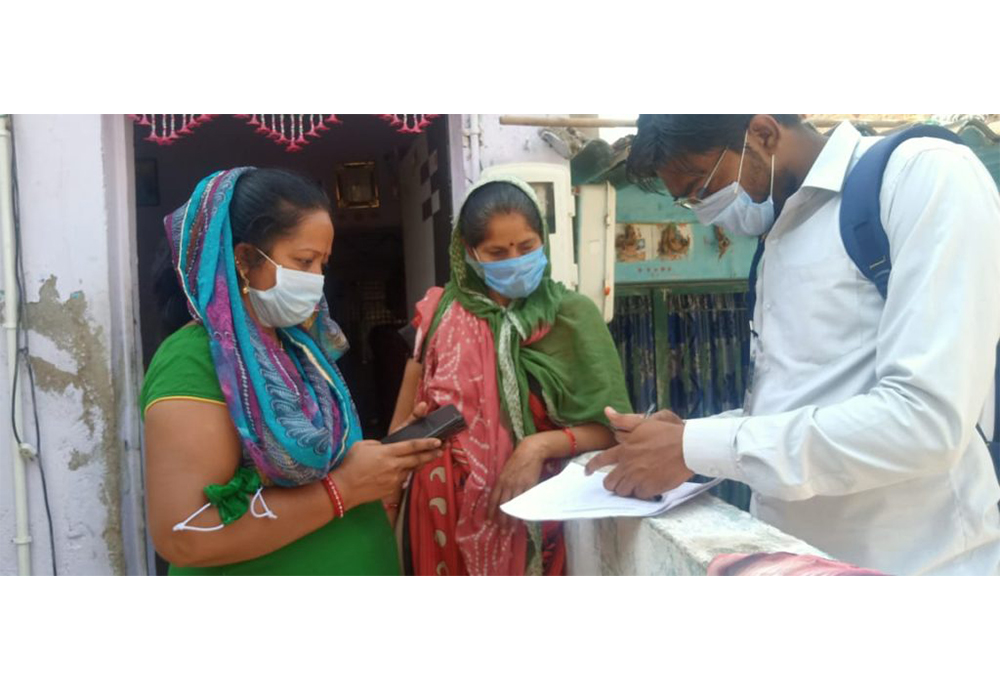
Meena Soni, A Covid Warrior
This is the story of Meena Soni, a woman community leader who emerged from Vishwas Nagar and has evolved into a guardian of her community. Her work as a community leader began in 2004, focusing on its development; since the lockdown began, she has proactively worked during the crisis by creating awareness, providing relief materials, and preventing further spread of transmissions. She has also worked with community leaders in 7 other slums by distributing food kits, conducting surveys and creating awareness regarding COVID-19.
Building awareness: This particular phase has led to MHT further leveraging technology to engage with its communities and mobilize its women. Meena, along with other community leaders, attended Zoom meetings organised by MHT and SEWA regarding awareness about different facets of Covid-19. She then disseminated the information to all the slums she is associated with as well as other women leaders through social media like Whatsapp or by arranging small meetings of 10-12 people (while ensuring social distancing). IEC material that was created on Covid-19 by the Urban Health Centre was also distributed in her locality even as she continuously ensured that community members were kept abreast with the latest information on various schemes introduced by governments during this period.
Providing essentials: Immediately after the lockdown was imposed, she contacted the ward councilor as well as social and religious institutions regarding requirement of food/ration in her slum and managed to arrange for 300-400 meals to be delivered daily for a month. These processes were implemented while ensuring that social distancing was maintained and all precautions were taken. In addition to providing cooked meals, Meena facilitated the distribution of ration kits provided by MHT, ensuring that disabled people, single parents, orphans, and other such vulnerable groups were given priority. To supplement the kits provided, she also conducted a needs assessment to identify other families that required rations, especially those that lived in rented facilities. In this way, she could help 150 families get ration kits. Meena has also provided for groceries, clothes and other essential items to the very needy in her community from her own pocket.
Meena’s work as a leader was not restricted by geography; she took initiative to help people in other slums as well as those that are homeless. For instance, just behind the Vishwas Nagar slum, 15-20 factory workers were living in the factory itself with their families as they were in dire straits. Meena provided them with two meals a day for 30 days.
Monitoring community’s health: Meena’s leadership skills are evident in the way she has dealt with tough situations, never hesitating in taking difficult decisions for the sake of the community’s health and safety.
Initially, when children and men of the community used gathered in groups and were not adhering to social distancing despite multiple requests, Meena called the police and had them handled the situation. Since that day, people are following social distancing protocols.
In another instance, Meena received information that relatives of a family in their slum had visited them from Gandhinagar. When she was met with resistance by the family on her request to have them tested, she dialed 100 and called the police, who then took them to Civil Hospital. After their reports came negative, she ensured that they self-quarantined for 14 days.
Meena, with the help of other CAG leaders, talked to the slum dwellers and came up with certain protocols for Covid-19. Outsiders were barred from entering the slum, and if anyone wanted to enter, they would
first need to talk to Meena. She has also got the entire community sanitized 4 times during the lockdown with the help of the ward councilor.
Supporting local livelihood: To ensure that the community did not come in contact with anyone infected, engagement with non-residents was kept to a minimal. Therefore, no vegetable vendors were allowed inside the slum. There already are 3-4 people in the slum who are vegetable vendors, so only those people were allowed to sell vegetables/fruits inside the community. She made sure that people from nearby neighbourhoods do not come to slum to buy vegetables from these vendors as it increased the risk of contracting the disease.
She helped the shop-owners and street vendors of her community get a health cards by connecting them to the concerned person in the Urban Health Centre. She also helped them get their COVID tests done by informing them about the Health Camp organized in a slum nearby.
Helping beyond her community: When Meena found out about an online form which migrants need to fill to go back to their respective native places, she helped many individuals fill the form as most slum dwellers are not the literate/educated. She also taught young people to fill the form so that they can also help as many people as possible.
To date, she has helped over 500 individuals travel to their native places by assisting them with the form, sharing relevant information of buses and so on.
Meena’s work, since she became a community leader, has been a reflection of the social capital that can be built in these otherwise disempowered communities. The lockdown has further catapulted her to the limelight, showcasing the range of her engagements and the power of community leadership.
Blog Courtesy: Konica Udhani and Roshini Diwakar
